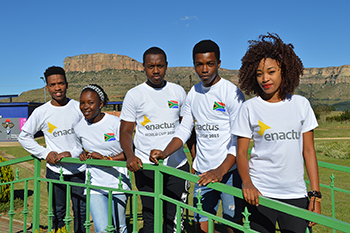Latest News Archive
Please select Category, Year, and then Month to display items
11 January 2021
|
Story André Damons
|
Photo Supplied
 Dr Ralph Clark
Dr Ralph Clark
The Afromontane Research Unit (ARU), the flagship research group of the University of the Free State (UFS) Qwaqwa Campus, has recently been granted R8,4 million to establish a Risk and Vulnerability Science Centre programme.
The Risk and Vulnerability Science Centre (RVSC) programme was established by the Department of Science and Innovation (DSI) as part of the Global Change Research Plan for South Africa and is funded by the DSI through the National Research Foundation (NRF). The RVSC will focus on the need to generate and disseminate knowledge about risk and vulnerability on global change challenges faced by local policy makers/ governance structures and communities in South Africa.
Invited to participate
Dr Ralph Clark, Director of the ARU, says the UFS, together with the University of Zululand and the Sol Plaatje University, has been invited to participate in Phase 2 of the RVSC programme. Dr Clark was approached by the DSI (on referral from the South African Environmental Observation Network – SAEON) in February 2020 regarding the potential for establishing a RVSC at the UFS Qwaqwa campus.
Subsequent interactions were held between the UFS and DSI, and in March 2020, the UFS formally accepted the DSI invitation. It has since been agreed that the RVSC: UFS will be hosted as a RVSC under the ARU umbrella, with dedicated personnel embedded at the UFS in this regard (internal processes and reporting) but reporting directly to the NRF regarding the RVSC.
Interest and support welcomed
Dr Clark welcomed this interest and support from the DSI-NRF, saying that the funds will further assist the UFS in growing its excellent and growing research portfolio and building more research capacity on this traditionally undergraduate-focused campus. “The RVSC will contribute to much-needed solutions in an area marked by major sustainability challenges and will assist in moving Phuthaditjhaba away from its negative apartheid history towards becoming a sustainable African mountain city,” says Dr Clark.
Enactus heeds call to be of service to its communities
2017-01-17

The newly-elected vice president of Enactus
University of the Free State, Solomuzi Khati
(third from left) with members of Enactus on
the Qwaqwa Campus.
Photo: Thabo Kessah
The future of South Africa is in good hands if Enactus activities are anything to go by. Enactus is an international non-profit organisation bringing together student, academic and business leaders committed to using entrepreneurial action to improve lives. And the Qwaqwa Campus chapter is doing exactly that – changing lives.
Community engagement
This team of enthusiastic and energetic students have touched the Qwaqwa community in more ways than one through their community engagement activities. One such activity was when they adopted the Team Spirit Centre as their partner for development and empowerment.
“Up to now, the chapter has lived up to its purpose of assisting and uplifting the Qwaqwa community. As part of our programme, we identified a problem that we are currently helping to solve,” said Solomuzi Khati, the newly-elected vice president of Enactus University of the Free State.
Skills development
“We have realised that many centres housing orphaned and vulnerable children, like the Team Spirit in Makoane in Qwaqwa, are not sustainable. Our project introduced a business concept to the centre where we helped to plant vegetables so the owner Mrs Manthabeleng could then use and sell at a later stage,” he said. “In the process, students and Mrs Manthabeleng would develop various entrepreneurial, finance and business skills for future use on top of the centre generating income to sustain itself,” he added.
Appointment of Advisory Board
Khati also revealed Enactus was in the process of inviting business and community leaders into their Business Advisory Board. “This is a group of business people who are recruited to serve as mentors for our team. Typically, a Business Advisory Board is composed of 10-50 business leaders in the community. Board members can keep students informed of current business concerns and trends, provide financial or in-kind assistance for projects, critique annual reports and presentations, and provide networking opportunities.”